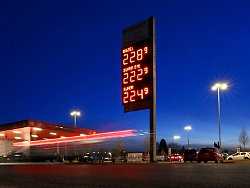Cash rain for mineral oil companies?
Fuel price at record high despite falling oil prices
3/15/2022 3:36 p.m
The price of crude oil is now similar to what it was before the war began – but little of it arrives at the gas station. This causes harsh criticism from politicians and from the ADAC. According to a trade association, the refineries and mineral oil companies in particular are currently making good money.
The fuel prices, which are still extremely high despite falling oil prices, are causing criticism of the mineral oil companies. “My impression is that a few oil multinationals are making the big bargain,” wrote Baden-Württemberg Finance Minister Danyal Bayaz on Twitter. The Green politician is likely to speak to the heart of many motorists, because while crude oil has almost returned to the price level before the start of the Ukraine war, premium petrol is around 45 cents more expensive, diesel even around 64 cents.
Normally, oil and gas prices move relatively in sync, but currently they are largely decoupled. At midday, the price of Brent oil, which is important in Europe, fell below $100 per barrel (159 liters) and was approaching pre-war levels. It had surged above $130 by early last week after the Russian attack. At the peak, a value of 139.13 dollars was even reached for a short time. Since then, however, the price has fallen sharply again. When it comes to fuel, however, nothing is noticeable. On the contrary: Both premium petrol of the E10 grade and diesel have become more expensive than cheaper during the phase of the oil price decline.
This discrepancy is also emphasized by the ADAC. “Despite all the war-related special effects and explanations for the high fuel prices – somewhere between oil production and gas station the additional driver’s money gets stuck,” says fuel market expert Jürgen Albrecht. “The mineral oil companies are currently making really good money in the refinery business.” The Fuels and Energy trade association (en2x) made a similar statement. A spokesman told the “daily newspaper” (taz): “The refineries are currently earning significantly more money than before.”
Gas stations themselves have little influence on the price
The association referred to higher demand with a simultaneous decrease in supply. The higher prices for fuels from domestic refineries or abroad are “an indicator of a product shortage, which in this case applies to Europe and the world”.
The managing director of the petrol station association ZTG, Jürgen Ziegner, also sees this scarcity. Particularly in the case of diesel and similar products, less is produced in Germany than is consumed. A relevant part of the import has so far come from Russia, but many traders are already anticipating a possible import ban. As a result, fuel is becoming scarcer and therefore more expensive. There is also fear and speculation. And it cannot be ruled out that some companies will try to invest some fat in order to be prepared for falling prices. The gas stations themselves, on the other hand, have little opportunity to set prices.
Fuel prices have been stagnating at a very high level for a few days. Super E10 cost 2.203 euros per liter on a nationwide daily average on Monday, as announced by the ADAC. That’s 0.4 cents more than the day before and almost an all-time high. Diesel rose 0.2 cents to 2.307, down 1.4 cents from last week’s record.
